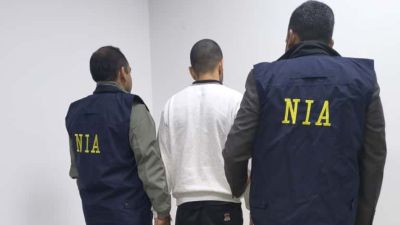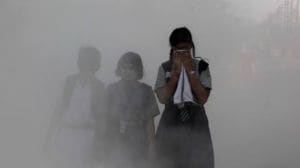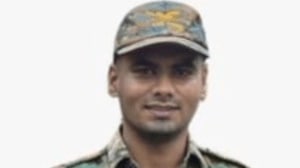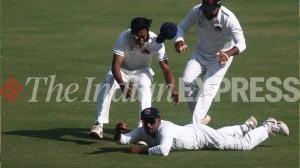Black,White,Coloured balls,and a plastic trumpet
South Africas capacity to have fun is matched by the complexity of its ethnicity/sport equation. So,the just-started football World Cup is both a great party and a great test for the rainbow nation.
South Africas capacity to have fun is matched by the complexity of its ethnicity/sport equation. So,the just-started football World Cup is both a great party and a great test for the rainbow nation. And making things more complicated,theres the vuvuzela.
For many South Africans,time stood remarkably still from the moment that FIFA president Sepp Blatter announced the country as host nation for the 2010 World Cup six years ago. For a minority it meant full-time work,short-term financial security and a steadily growing wave of hope,optimism and anxiety,but most of the countrys 50-plus million population didnt have a clue what it meant for them and what was in store.
And they still dont really know what has hit them even now that the biggest show on earth has begun.
They are beginning to realise that it is not,despite all the nationalistic hype and razzmatazz,a South African event after all. It belongs to FIFA and,just as the IPL did during season two,they have taken charge of everything in a way that makes residents feel as much of a host as a lady of the night does when hired by the hour in a cheap motel room.
Having said that,South Africans are a resilient bunch when it comes to having a good time and if they were still happy to support the IPL in their hundreds of thousands despite coming to the realisation that it was a little like having unprotected sex,then they certainly arent going to complain about the World Cup rolling into town and sleeping with their sisters.
All of the official promotion before the tournament began centred around the idealistic but nonetheless happy notion of the country throwing its collective arms open to the 31visiting nations and showing them a good old-fashioned South African welcome. In reality,most people who have thrown themselves into an active participation role are treating the month as an opportunity to cash in.
Restaurant and hotel owners have increased capacity and raised prices (mostly not exorbitantly but significantly) and transport networks,from airlines to trains and luxury coaches,have doubled their fares. You would expect that.
But thousands of families have also put their houses on the rental market for the duration of the tournament and moved,or are still prepared to move,to less desirable locations or to stay with relatives. Some have been remarkably fortunate and will make enough money to make a material difference to their budgets for years,others less so. Despite official (and many unofficial) websites advertising accommodation,its been a random,hit-and-miss process.
The Indian cricket teams conditioning coach,Paddy Upton,kept his bachelor flat after his marriage four years ago with the express purpose of renting it during the tournament. Barely a five-minute walk from Cape Towns iconic new stadium,which was nothing but an impressive plan back then,he has yet to receive an offer! And hes not the only one still checking his inbox.
The rugby and cricket World Cups have already been staged in South Africa and both have played a tangible part in bringing together what was,by the end of the 1980s,one of the most divided nations on earth. Not nearly as big a role as Nelson Mandela,of course,but legacy-creating nonetheless. All three,however,could be dwarfed by what might happen in the next four weeks and for decades to come.
Football was always different to everything else in South Africa. Even at the height of apartheid,it broke down barriers (and laws) like nothing else. Inter-racial cricket always took place,but it was,by and large,at club level and always backed down when the police made it clear that push was turning to shove.
But when South African football attempted to implement the strict racial divides which existed in other sports,it became perfectly obvious to the white teams (unlike their cricketing counterparts) that they were kidding themselves if they thought they were the best. Sporting instinct took over and before long the best and most ambitious white players were regular visitors to the black townships. But not the other way around. There was only so much insubordination the authorities could tolerate.
For the last two decades,however,the divides between white,coloured (including Indian) and black have closed despairingly slowly when it comes to the beautiful game. English and even Afrikaans speakers (who traditionally favour rugby far above all else) amongst the white population have followed English Premier League teams rather than South African ones while black supporters have been passionate about their local teams so much so that Bafana Bafana,the national team,can barely draw a crowd. Millions of Indian South Africans,from Lenasia (Johannesburg) to Durban the largest Indian population outside the subcontinent found themselves somewhere in between. And settled for cricket!
In a sense,then,everyone is starting from a similar position with regard to supporting the national team. Kaiser Chiefs against Orlando Pirates in Soweto,the biggest derby in the country,will attract as many as the stadium can hold at least 60,000 per match. The national team has,on occasion since its decline from African Champions back in 1996,played in front of closer to 6,000 at times. The players were just that,players,unless they were in club colours.
For those with a discerning interest in football,the adoption of the vuvuzela as an all-encompassing tool to bring South African supporters together is unfortunate. Originally used as an (awful,tuneless) instrument on marches by the Shembe religion,a mixture of Zulu and Old Testament fundamentalism almost a century ago,it has now reached levels of both noise and obnoxiousness rarely,if ever,previously attained by anything. Anywhere.
The plastic trumpet,which will forever be associated with this World Cup,would be far better employed recycled and used as anything else. Condoms,perhaps. Or as punishment for errant criminals in jail. Even as a method of torture endorsed by the United Nations. The only way to endure the 120-plus tuneless decibels which emanate from it is to buy one yourself and join in. Unless you fancy your chances at beating the 500 people around you senseless. The vuvuzela makes WWF wrestling look sophisticated and grunge rock sound like Pavarotti.
Then there is the question of security. South Africas reputation as one of the worlds hotbeds of robbery,hijacking and general slaughter may be exaggerated,but it came from somewhere. And nobody made it up. Not even good tabloid media can do that. Murder,rape and vicious,almost unimaginable violent crime are a reality in South Africa and they can,if youre unlucky or unvigilant,arrive within seconds of the most fun,most beauty or best quality youve ever experienced.
The South African government and tourism authority would much rather we didnt talk about the truth in such graphic detail,of course,but its the truth. For all the beauty of Cape Towns waterfront,the winelands of Stellenbosch,Durbans culture and the Drakensburg mountains,even Johannesburgs rousing restaurant and nightlife scene,there are the facts. The crime facts.
The South African Police Force are stationing 40,000 of their force almost 50 per cent exclusively to World Cup venues,hotels,popular recreation areas and travel routes. For those of us left living in the suburbs,it means,by their own admission,that police will be in short supply in the event of thuggery,house-breaking and hijacking. We have even been advised to lock doors and entertain inside while watching games on television at home. And to be extra vigilant when taking our children out to shopping malls during the tournament as child-snatching gangs will be looking to take advantage of the situation.
The most common fear,however,at least amongst those fortunate and affluent enough to have that luxury,is about the nations economy once everyone has left. If Greece was plunged into a long,slow and irreversible debt crisis because of the 2004 Olympic Games,what will South Africa face having borrowed substantially more money to build stadiums in areas like Nelspruit,Rustenburg and Port Elizabeth that have never,and will never generate the income to sustain them?
There is as much to be optimistic about as there is to be pessimistic about. The only difference is that the pessimism appears to be based on facts,figures and reality while the optimism has its cornerstone in the Mandela vision of the Rainbow Nation and the unification of all its peoples,cultures and ethnicities under one sporting umbrella never previously shared.
The nation was told to expect the worst Black,White,Coloured and Indian when the ANC took control and the new constitution was enshrined almost two decades ago. Civil war,we were told,was inevitable. It never even flickered. It seems impossible,now,with all that the new South Africa has been through and achieved,that the World Cup could go wrong. Not in the next couple of weeks,anyway.
Years down the line there will undoubtedly be questions asked. Chief amongst them will be: It was a hell of a party,but was it worth the price? And whatever happens,there will be those who answer yes and those who answer no.
Neil Manthorp is a sports writer and broadcaster based in Cape Town




- 01
- 02
- 03
- 04
- 05



























